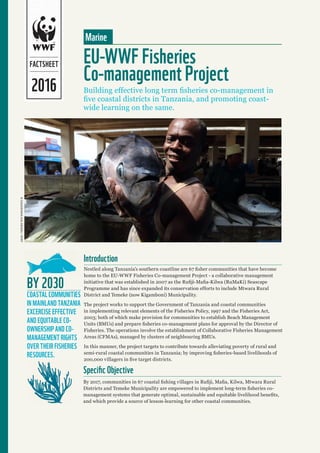FishCom 2016 Factsheet
- 1. Nestled along Tanzania’s southern coastline are 67 fisher communities that have become home to the EU-WWF Fisheries Co-management Project - a collaborative management initiative that was established in 2007 as the Rufiji-Mafia-Kilwa (RuMaKi) Seascape Programme and has since expanded its conservation efforts to include Mtwara Rural District and Temeke (now Kigamboni) Municipality. The project works to support the Government of Tanzania and coastal communities in implementing relevant elements of the Fisheries Policy, 1997 and the Fisheries Act, 2003; both of which make provision for communities to establish Beach Management Units (BMUs) and prepare fisheries co-management plans for approval by the Director of Fisheries. The operations involve the establishment of Collaborative Fisheries Management Areas (CFMAs), managed by clusters of neighbouring BMUs. In this manner, the project targets to contribute towards alleviating poverty of rural and semi-rural coastal communities in Tanzania; by improving fisheries-based livelihoods of 200,000 villagers in five target districts. By 2017, communities in 67 coastal fishing villages in Rufiji, Mafia, Kilwa, Mtwara Rural Districts and Temeke Municipality are empowered to implement long-term fisheries co- management systems that generate optimal, sustainable and equitable livelihood benefits, and which provide a source of lesson-learning for other coastal communities. FACTSHEET 2016 EU-WWF Fisheries Co-management Project Marine Building effective long term fisheries co-management in five coastal districts in Tanzania, and promoting coast- wide learning on the same. BY 2030 COASTAL COMMUNITIES IN MAINLAND TANZANIA EXCERCISE EFFECTIVE AND EQUITABLE CO- OWNERSHIP AND CO- MANAGEMENT RIGHTS OVER THEIR FISHERIES RESOURCES. Specific Objective Introduction ©GAUDENSIAKALABAMU/WWF
- 2. WWF Tanzania Country Office .:|:. Plot 350 Regent Estate, Mikocheni P. O. Box 63117, Dar es Salaam, Tanzania .:|:. wwf.panda.org Working to sustain the natural world for people and wildlife panda.orgtogether possibleTM •EU-WWFFISHERIESCO-MANAGEMENTPROJECT•WWF.PANDA.ORG The indisputable success of the fisheries co-management programme is owed largely to its participatory and adaptive nature as it works concurrently on two thematic areas: effective long-term fisheries management and livelihood development through small- scale village savings and loans initiatives and enterprise skills development. The following are some of the achieved results: The project is mentoring and monitoring 63 BMU groups from over 67 coastal communities to undertake fisheries management activities such as engage in patrol and surveillance, collect fisheries catch data and participate in governance aspects of fisheries; Current levels of BMU performance are good, but need to be strengthened by mainstreaming BMU activities into district implementation systems, and by securing funds for BMU operations; 53 BMUs have established 15 CFMAs, covering about 3,630 km2, 69% of near- shore waters in the project area; and 26% of the total nearshore waters of Tanzania mainland. Nine (9) more BMUs are currently in the process of establishing new CFMAs; To date, the project is mentoring 273 savings and credit groups, refered to as Village Community Banks (VICOBA). 146 groups have been established by the project - 127 of which are community-driven. The groups have 7,632 members (32% men and 68% women) and a total annual income (FY 2016) estimated to be about EUR 2,375,000 as a revolving fund to members; The project has facilitated the reduction of political tension in Kilwa district by involving communities in collaborative fisheries management; as a result of this, nine (9) more BMUs have been established in Kilwa and are currently in the process of forming CFMAs; The project has facilitated the inclusion of the CFMA approach into the National Fisheries Act and the National Fisheries Co-management Guidelines, both of which are in final review stages; The project has assisted in strengthening central-local government linkages by engaging the Ministry of Local Governments in fisheries forums; The project has been instrumental in the establishment of the South West Indian Ocean Fisheries governance (SWIOFish) project; Effort by BMUs has thus far halted further declines in fish catches - a result of continued illegal fishing, particularly blast and beach seine fishing. PROJECT DETAILS The project is coordinated from the WWF Tanzania Country Office (WWF TCO) in Dar es Salaam and from field offices embedded in district council offices in Mafia, Kilwa & Mtwara. Partners 1. Communities in 67 coastal villages; 2. Rufiji (Kibiti), Mafia, Kilwa, Mtwara Rural Ditrict and Temeke (Kigamboni) Municipality; 3. Ministry of Regional Administration and Local Government; 4. Fisheries Department, Ministry of Agriculture, Livestock & Fisheries. Programme outputs and results ©WWF For more information, contact Dr. Mathias Igulu Programme Coordinator Fisheries Co-Management Programme WWF Tanzania Country Office P.O. Box 63117 Dar es Salaam, Tanzania Tel.:+255 22 277 5346/277 2455 Email: migulu@wwftz.org ©GAUDENSIAKALABAMU/WWF ©WWF ©GAUDENSIAKALABAMU/WWF Supported by:


